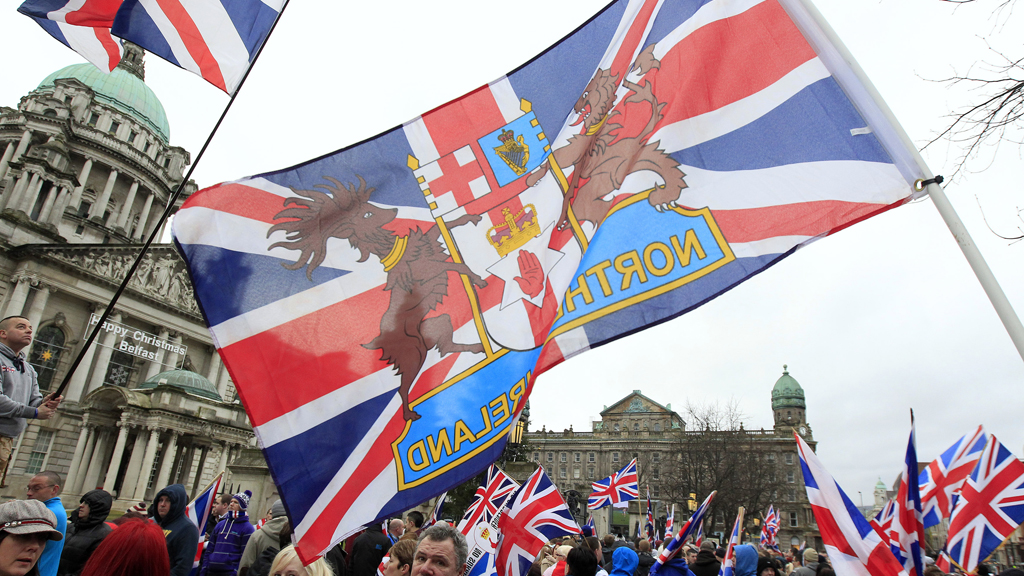Union flag flies over Belfast City Hall for Kate’s birthday
As the union flag is flown at Belfast City Hall for the first time since protests began, Channel 4 News looks at what the row reveals about post peace process democracy.

The union flag was flown on Wednesday for the first time since December, when Belfast City Council voted to reduce the number of flag-flying days.
The decision sparked regular protests from loyalists, many of which in recent days have become violent. Protesters on Tuesday night pelted police with bottles and stones in a new outbreak of trouble in east Belfast for the sixth night in a row. The violence comes amid warnings that potential investors are turning away because of the street violence.
Chief Correspondent Alex Thomson was at the scene in the Castlereagh Road area of east Belfast.
#belfast #c4news I watched a Loyalist crowd of 2-300 assemble and attack police with zero provocation from anyone.
— alex thomson (@alextomo) January 9, 2013
#belfast #c4news local DUP councillor there said: “nothing I could say would make these kid stop throwing stones at the police”
— alex thomson (@alextomo) January 9, 2013
Politically engaged?
Northern Ireland First Minister Peter Robinson said that representatives of the various unionist parties will meet at Stormont on Thursday to discuss the protests, which police warned are being led by members of the Ulster Volunteer Force.
However politicians are concerned that protesters appear to have little interest in engaging with the mainstream Unionist parties, or with Belfast councillors. An alternative Ulster People’s Forum has been set up by victims campaigner Willie Frazer and others, claiming representation for the anti-flag sentiment – although not the violence – and there seems little appetite among it for political negotiation.
Instead Mr Frazer has called for a return to direct rule over Northern Ireland from Westminster, rejecting dialogue and representation from Northern Ireland’s politicians. The apparent disaffection with the political process among the protesters follows a warning by the Electoral Commission about a worrying decline in the number of registered voters in Northern Ireland: around 400,000 people are not registered at the correct address, and the register is just 71 per cent complete.
When it comes to the row over the flag, there was an opportunity for those opposed to the restrictions of flag flying to voice their views democratically: the vote at the city council followed a 16-week consultation period ending on 1 October, which involved public meetings in September, an online questionnaire and advertisements in the media.
However just three members of the public showed up to the meetings.
"The peace process has failed us... Politicians have sold us down the river": Read more from east Belfast
Around 900 written responses were received, which included “a number of identical letters”, according to the council’s official report on the consultation. The council did receive a petition of under 15,000 signatures, but this rejected all four proposals put forward by the council in accordance with its equality impact assessment.
Flag flying
The unrest has continued intermittently since Belfast City Council’s decision last month to reduce the number of days the flag flies to 18 days [see list of designated days below]. This is the same number as government buildings in England, and compares to 15 designated days at Northern Ireland’s government buildings at Stormont.
The input from politicians has so far failed to make a difference to protesters. But on Wednesday, it was the turn of the business community, who said the disruption has had a disastrous impact on trade over the holiday period, particularly for restaurants.
The Confederation of British Industry (CBI) claimed jobs would be lost and shops shut unless there is an immediate end to the trouble. CBI Northern Ireland director. Nigel Smyth warned: “We are already aware of investors who have lost interest because of these disruptions.
A total of 66 police officers have been hurt and 104 arrests made since the protests started a month ago.
Newly designated flag flying days at Belfast City Hall:
9 January Birthday of The Duchess of Cambridge
20 January Birthday of The Countess of Wessex
6 February Her Majesty’s Accession
19 February Birthday of The Duke of York
10 March Birthday of The Earl of Wessex
11 March Commonwealth Day (second Monday in March)
17 March St. Patrick’s Day (in Northern Ireland only)
21 April Birthday of Her Majesty The Queen
9 May Europe Day
2 June Coronation Day
10 June Birthday of The Duke of Edinburgh
15 June Official Celebration of Her Majesty’s Birthday
21 June Birthday of The Duke of Cambridge
17 July Birthday of The Duchess of Cornwall
15 August Birthday of The Princess Royal
10 November Remembrance Day (second Sunday in November)
14 November Birthday of The Prince of Wales
20 November Her Majesty’s Wedding Day